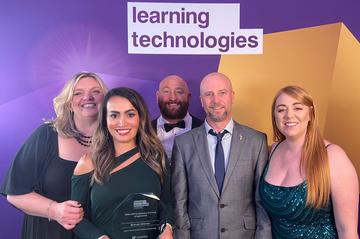Conveyancing Q&A: Pathways to conveyancing
Wed 13 Mar 2024

Michelle Timms
Product Manager / Property Law Tutor
As it's National Conveyancing Week, we thought now was the ideal time to sit down with our resident expert Michelle Timms and answer some of the hottest questions about the industry, training and the future!
With nearly 20 years’ experience in the conveyancing industry, Michelle is Product Manager for MOL’s property courses. She is a qualified Licensed Conveyancer and was previously a Legal Director at a busy conveyancing firm.
Michelle also has taught on the Level 4 and Level 6 Diplomas in Conveyancing Law and Practice for 12 years, seeing many people qualify themselves, and still retains some tutoring responsibilities.
In this Q&A, we asked Michelle about how to become a conveyancer, including the different pathways to conveyancing and how long it may take.
Becoming a conveyancer
What qualifications do you need to become a conveyancer?
There’s a very clear training path to becoming a licensed conveyancer.
Firstly, you will need to obtain a qualification, such as a Level 4 Diploma in Conveyancing Law and Practice, followed by a Level 6 Diploma in Conveyancing Law and Practice. Additionally, you’ll need to gain practical experience working in conveyancing under the supervision of a licensed conveyancer or solicitor.
After completing the necessary qualifications and gaining practical experience, you can apply to become a licensed conveyancer through the Council for Licensed Conveyancers (CLC).
What’s the difference between studying a conveyancing apprenticeship and studying a Level 4 Diploma in Conveyancing?
Studying a conveyancing apprenticeship and studying a Level 4 Diploma in Conveyancing both provide valuable qualifications for individuals looking to pursue a career in the field of conveyancing.
The main difference between the two lies in the structure and format of the programmes. A conveyancing apprenticeship typically involves a combination of on-the-job training and a qualification, with the apprentice gaining practical experience alongside theoretical knowledge.
On the other hand, a Level 4 Diploma in Conveyancing Law is a more focused and intensive course that provides in-depth knowledge of the legal principles and practices involved in conveyancing.
Ultimately, both pathways can lead to a successful career as a Licensed Conveyancer. However, the choice between an apprenticeship and a diploma will depend on individual preferences, learning styles, and funding.
What qualifications/experience do I need to study a Level 4 Diploma in Conveyancing?
To study a Level 4 Diploma in Conveyancing, you don’t need any previous qualifications, but it’s recommended that you have at least a Level 2 qualification in English and maths, and that you’re gaining relevant conveyancing experience in your work.
The Level 4 Diploma in Conveyancing is a professional qualification that requires a high level of knowledge and understanding of conveyancing processes and procedures. Therefore, it’s important for candidates to have a keen interest in property law and the conveyancing process.
How long does it take to become a licensed conveyancer?
The length of time it takes to become a Licensed Conveyancer will vary depending on your individual circumstances. On average, it takes two to three years to complete the necessary qualifications and gain the required experience. However, this timeframe depends on factors such as your existing qualifications, the amount of time you can dedicate to studying, and the availability of relevant work experience opportunities.
It’s important to note that the information provided here is a general estimate and may not apply to every individual.
Can I retrain as a conveyancer at any age?
Yes, it’s possible to retrain as a conveyancer at any age. To become a conveyancer, you need to obtain an approved qualification such as a Level 4 Diploma in Conveyancing Law and Practice, which can be done via distance learning, allowing you to continue working while you train.

Licensed Conveyancing
Qualifications
We’re proud to offer nationally recognised SQA qualifications in Licensed Conveyancing.




